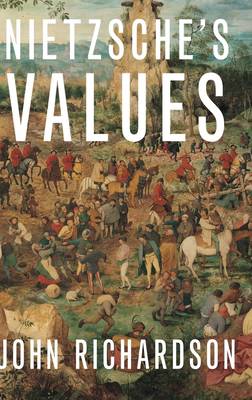
Door een staking bij bpost kan je online bestelling op dit moment iets langer onderweg zijn dan voorzien. Dringend iets nodig? Onze winkels ontvangen jou met open armen!
- Afhalen na 1 uur in een winkel met voorraad
- Gratis thuislevering in België vanaf € 30
- Ruim aanbod met 7 miljoen producten
Door een staking bij bpost kan je online bestelling op dit moment iets langer onderweg zijn dan voorzien. Dringend iets nodig? Onze winkels ontvangen jou met open armen!
- Afhalen na 1 uur in een winkel met voorraad
- Gratis thuislevering in België vanaf € 30
- Ruim aanbod met 7 miljoen producten
Zoeken
Omschrijving
John Richardson here organizes Nietzsche's thinking around the central and unifying concept of values. Richardson maps in detail Nietzsche's arguments, which crucially distinguish three basic ways of valuing. The first is the valuing Nietzsche attributes to all living things, and to us humans in our bodies; Nietzsche insists that we already value in our drives and affects. The second is our distinctively human valuing, which we carry out as subjects and agents; these conscious and worded values are superimposed on those bodily ones, in ways Nietzsche finds deeply problematic. The third is the new way of valuing that Nietzsche offers as his lesson from that diagnosis and critique of our human values; these new values are centered on a universal affirmation or "Yes," epitomized in the thought of eternal return. Each of the book's twelve chapters examines a different aspect of one of these ways of valuing, showing the complexity of Nietzsche's thinking on its topic, but also its unity and consistency. Incorporating recent advances in philosophical scholarship on Nietzsche, Richardson's thought-provoking new interpretation will serve as a vital updated reference point for future work.
Specificaties
Betrokkenen
- Auteur(s):
- Uitgeverij:
Inhoud
- Aantal bladzijden:
- 568
- Taal:
- Engels
Eigenschappen
- Productcode (EAN):
- 9780190098230
- Verschijningsdatum:
- 31/07/2020
- Uitvoering:
- Hardcover
- Formaat:
- Genaaid
- Afmetingen:
- 165 mm x 239 mm
- Gewicht:
- 952 g

Alleen bij Standaard Boekhandel
+ 250 punten op je klantenkaart van Standaard Boekhandel
Beoordelingen
We publiceren alleen reviews die voldoen aan de voorwaarden voor reviews. Bekijk onze voorwaarden voor reviews.











